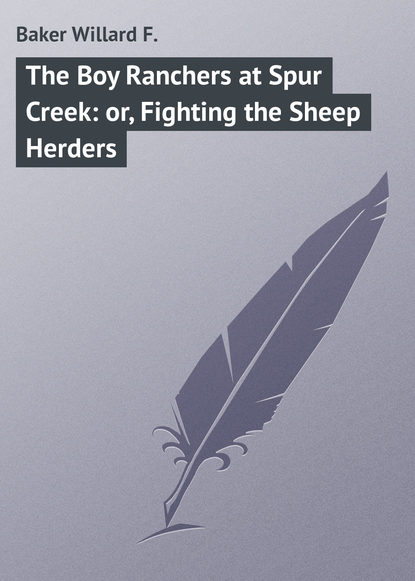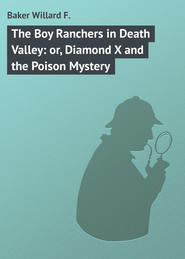По всем вопросам обращайтесь на: info@litportal.ru
(©) 2003-2024.
✖
The Boy Ranchers at Spur Creek: or, Fighting the Sheep Herders
Настройки чтения
Размер шрифта
Высота строк
Поля
This was very true, and though Nort and Dick had once been in the "tenderfoot" class, they had learned of the deep-seated hatred that existed on the part of a cattle man against a sheep owner.
There is a real reason for this. Horses and cattle in the West just naturally hate sheep. It may be that the cattle and horses recognize that the sheep is such a greedy eater that he practically cleans off the grass down to the very roots, whereas a steer or horse leaves enough of the herbage to grow for the next time.
Then, too, the strong smell of sheep seems to annoy horses and cattle. Often a bunch of steers or a herd of horses will stampede and run for miles, merely after getting a whiff of the odor from a bunch of sheep. They will even do this if, in grazing, they come to a place where sheep have been eating. And if sheep wade through a creek the odor of their oily wool seems to remain for days, and horses and cattle refuse to drink, unless almost dying of thirst. So much for the animals themselves, and because of this there was unending war between the horses and cattle on one side, and sheep on the other. Though it cannot be said that the meek sheep did any fighting. They never stampeded because they had to drink from streams where cows and horses had watered, nor did they refuse to nibble grass left by the larger animals.
Aside from the fact that the horse breeders and cattle men were pioneers on the old open range, and naturally resented the coming of the lowly sheep herders, there is another reason for the hatred. Sheep, as I have said, nibble the grass to its very roots. And then the small and sharp feet of the sheep cut into the turf and so chop what few roots that are left as to prevent a new crop of grass from growing – the fodder dies off. And as the sheep are kept constantly on the march, as they greedily eat their way, they spread ruin – at least so the ranchmen thought. So it was and had been war.
"This is bad news – bad news!" muttered Mr. Merkel. "We ranchers will have to get together and talk it over. We've got to do something! I want to talk to Tom Ogden." He was the owner of Circle T ranch, and a friend of Mr. Merkel.
"Shall I go for him in the flivver?" asked Bud, for since the advent of the little car he and his cousins often journeyed in it, leaving their horses in the corral. Though there were places where only a horse could be used, and of course for cattle work no cowboy would think of anything but of being in the saddle.
"No, thank you. I'll call him on the wire," said Mr. Merkel. "I'll have him bring some of the other ranchers over. We've got to act quickly."
"When does the land-grabbing start?" asked Dick.
"It's open now – has been for the last two weeks. This notice is late," said Mr. Merkel, looking at the paper in his hand. "Even now some of the sheep men may be coming up from the Mexican border. We've got to do something mighty sudden!"
Seldom had Bud and his cousins seen Mr. Merkel so moved, and the boys realized from this the grave danger.
That evening a number of wealthy and influential ranch owners gathered at Diamond X to talk the situation over. As cattle men in a small way, the Boy Ranchers, as they were called, were allowed to "sit in" on the conference.
"The worst of it for me," said Mr. Merkel, "is that the range where I breed my best steers is near this Spur Creek tract, and the sheep will naturally over-run my feeding ground."
"Can't you fence it in?" asked Mr. Ogden.
"Too late for that now; it would take weeks to get the wire here, and some of those onery sheep men wouldn't mind cutting the strands, anyhow. It only takes one night for a band of sheep to ruin a good many miles of pasture. No, what we've got to do is to fight 'em from the start – not let 'em get there."
"We'll take up the land ourselves!" exclaimed Henry Small.
"Can't, Hen," objected Mr. Merkel. "We all own our full share now, and maybe a little more. Of course, when you look at it from a legal standpoint a sheep man has just as many rights under the government as we have. But not by custom or western ways."
"Not by a long shot!" cried the other ranchmen.
"I hope your papers are all straight," observed Mr. Ogden to Bud's father.
"What papers?"
"Your deeds and documents that give you the right to land on this side of Spur Creek. If there's a legal question the sheep men may try to jump some of your claims."
"Oh, I guess not," said Mr. Merkel easily. "My papers are all in my safe, and I can prove title by them easily enough. But, gentlemen, what are we going to do? That's the question now. What are we going – "
Mr. Merkel never finished that sentence. For he was interrupted by a fusillade of shots just outside – shots in the night.
An instant later every man in the conference room, and the boy ranchers included, had leaped to his feet, and many hands sought the "guns" that were within easy reach.
"Some of your cowboys disporting themselves?" asked Mr. Ogden of the owner of Diamond X.
Mr. Merkel shook his head.
"Nothing like that," he remarked.
Some one yelled – there were more shots and then the voice of Slim Degnan, foreman of the ranch, was heard shouting:
"Get after 'em, boys! Head 'em off!"
"It's a stampede!" yelled Bud. "Come on, fellows!"
CHAPTER II
MISSING PAPERS
Nort and Dick lost no time following their cowboy cousin, Bud, outside the ranch house, and each of the three lads, as well as Mr. Merkel and his associates, had caught up one of the heavy revolvers that were never far from their hands. For, as has been said of the West, a man doesn't always need a gun out there, but when he does need it, he needs it "mighty bad and mighty sudden."
The boy ranchers were taking no chances.
"What's the matter, Slim?" asked Bud as he rushed outside and saw a group of cowboys near the foreman. They were vaulting to the saddles of their horses which had hurriedly been turned out of the home corral.
"Rustlers!" cried Nort. "Is it rustlers, Slim?"
"Might be, for all I can tell," was the answer. "I saw some men riding along out there, and when I called to know who they were they didn't answer, which was suspicious in itself. Then I told 'em to stop until I could get a look at 'em, but they turned and made off, and that was worse, so I fired a couple of times after 'em."
"Where are they now?" asked Dick.
"That's what we're going to find out; son," was the foreman's grim answer. "You there, Babe?" he called to his fat assistant, who rejoiced in the diminutive nickname.
"All there is of me," was the sighing answer. "Stand still there, you slab-sided chunk of salt pork!" he called to his horse, which was nervously swerving about. And Babe Milton was too heavy to be a quick mounter. He needed special attention on the part of his steed.
"Let's go, fellows!" cried Bud to his cousins, and, not waiting for the permission of Mr. Merkel, the lads saddled their horses and started after the foreman and his cowboys who had gotten a flying start.
"What do you imagine it is?" asked Nort as he rode between his brother and cousin, while they urged their steeds on to catch up to those ahead of them.
"Haven't any idea," answered Bud, glancing back to note that his father and the visiting ranchmen had gone into the house. Probably Mr. Merkel and the others knew the matter could safely be left to the cowboys.
Bud and his cousins rode fleet ponies, and they were more than at home in their saddles, so it did not take them long to reach the bunch of cowboys riding across the plains ahead of them, on the trail of the mysterious night visitors.
"Any idea who they were, Slim?" asked Bud, guiding his horse alongside that of the foreman.
"Not the least in the world. But they're up to no good or they wouldn't have veered off at the first hail. There's something suspicious in that."
"I should say so," agreed Nort.
"Couldn't be any sheep herders coming so soon, to turn their nibblers on our land; could it?" Dick wanted to know. He spoke of "our land," for he and his brother owned a small ranch in partnership with Bud.
"No, I don't reckon it was the sheep herders themselves," said Slim, "but it might be some of their bunch coming to size things up. The government never made a worse mistake than to throw this Indian land open to everybody. Them fellers at Washington should have barred the sheep men!"
To hear Slim talk you would have imagined that he could go to Washington and regulate matters all by himself. But if you understand the feeling of western cattle men and horse men against sheep herders it will make it easier to comprehend.
"Well, if any of 'em try to come to Happy Valley," said Bud, "they'll wish they'd stayed out."










